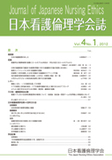Japanese
English
- 販売していません
- Abstract 文献概要
- 参考文献 Reference
- サイト内被引用 Cited by
本研究の目的は、Lútzénらが開発し2006年に改訂した道徳的感受性質問紙(rMSQ)をもとに日本語版(J-MSQ)を作成し、測定用具としての妥当性を検証することである。J-MSQの作成には、rMSQ開発者とのやりとりによる各質問項目の意味の特定、有識者による質問文の検討、翻訳/逆翻訳の段階を経た。回答は6段階のリッカート尺度とし、一般病院の看護職を対象に計210の質問紙を配布し141件の回答を得た。因子分析の結果、rMSQの3つの因子、Moral Strength(MS)、Sense of Moral Burden(SMB)、Moral Responsibility(MR)と一致する因子が抽出された。信頼性係数はそれぞれ.798、.622、.144であった。LútzénらによるrMSQの構成概念は日本の看護師に適用できる可能性とともに、MRを測定する質問項目に関しては今後見直す必要が示唆された。
The purpose of this study was to validate an instrument to examine the Japanese nurses' moral sensitivity. The revised Moral Sensitivity Questionnaire (rMSQ), originally developed and revised by Lútzén et al. (2006), was chosen. This rMSQ consists of nine items with three latent factors. A Japanese version of the MSQ was developed by taking the following steps: 1) frequent communications with the author of the rMSQ to clarify the meaning of each item, 2) item reviews by research and clinical expert nurses until the items were confirmed as being easy for Japanese nurses to understand, and 3) translation and back-translation between the two languages. The questionnaire was given to 210 nurses who worked in two different hospitals, of whom 141 responded. A 6-point Likert scale was adopted. A factor analysis extracted the same three factors as Lútzén et al. had identified; “Moral Strength”, “Sense of Moral Burden”, and “Moral Responsibility”. The Cronbach's alfa was .798, .622, and .144, respectively. It was suggested that the conceptual framework of moral sensitivity could be applied to Japanese nurses. However, considering the low coefficient of reliability, items for the subscale “Moral Responsibility” of the Japanese version of the MSQ need further reviewing.
Copyright © 2012, The Japan Nursing Ethics Associatin. All rights reserved.


